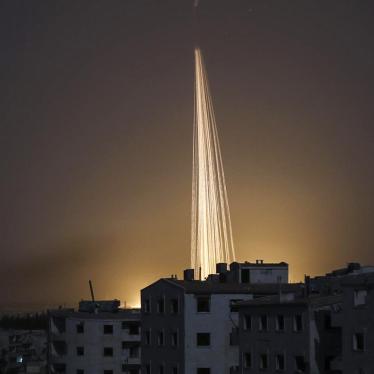(Beirut) – Afghanistan should be commended for its ratification of the international convention banning cluster bombs in defiance of pressure from the United States, Human Rights Watch said today as a major diplomatic meeting of the convention opened in Beirut, Lebanon.
“Afghanistan signed the Convention on Cluster Munitions despite heavy pressure from the US not to, and now it has ratified despite continued US opposition to it,” said Steve Goose, director of the Arms Division at Human Rights Watch. “Now that Afghanistan is a full member of the convention banning cluster munitions, these indiscriminate weapons should never be used in the country again, by the US or any other armed forces.”
Afghanistan signed the convention in Oslo, Norway on December 3, 2008, after a directive from President Hamid Karzai. The signature came as a surprise as Afghanistan did not participate in the negotiations of the convention and had indicated it would not be able to sign.
United States Department of State cables made public by Wikileaks this year have shown how US officials sought to influence the Afghan government against signing the convention. By ratifying the convention on September 8, 2011, Afghanistan is legally bound by all of its provisions.
“Afghanistan has suffered greatly from the use of cluster munitions,” said Goose. “By signing and ratifying the convention, it is no longer a victim on this crucial humanitarian issue, but a champion.”
Over the past decade, Human Rights Watch has documented the devastating effects of cluster bomb use in Afghanistan. Soviet forces used cluster munitions during their invasion and occupation of Afghanistanfrom 1979 to 1989, and a non-state armed group used cluster munitions during the conflict in the 1990s.Between October 2001 and early 2002, United States aircraft dropped 1,228 cluster bombs containing 248,056 bomblets in 232 strikes on locations throughout the country. According to Cluster Munition Monitor, at least 771 casualties from cluster munitions have been recorded in Afghanistan.
It is not believed that any forces have used cluster munitions in Afghanistan since 2002, although some Coalition forces have acknowledged deploying cluster munitions to Afghanistan for possible use.
The Convention on Cluster Munitions was adopted in May 2008 and entered into force on August 1, 2010, becoming binding international law. As of September 13, 2011, a total of 110 nations had signed or acceded to the convention, which 63 states had ratified, becoming full states parties. Swaziland acceded to the Convention on Cluster Munitions on September 13, 2011, during the Second Meeting of States Parties, becoming the 63rd state party.
The Second Meeting of States Parties to the Convention on Cluster Munitions is being held in Beirut on September 12 -16, 2011. Lebanon is also a country with significant cluster munition contamination after Israel fired an estimated 4 million submunitions into the country during the 2006 conflict.
Approximately 120 governments are expected to participate in the meeting including more than 30 observer nations that have not yet acceded to the convention.
“By participating in the Beirut meeting, governments can reaffirm their support for the convention’s objective of ending the suffering caused by cluster munitions,” said Goose. “We expect to hear from all states on actions they are taking to join and implement the ban on cluster bombs.”
In Beirut, states will discuss their work to implement the 66-point action plan agreed on at their last meeting held in Vientiane, Lao PDR in November 2010. Under the convention, states parties are required to destroy their stockpiled cluster munitions within eight years, clear contaminated land within 10 years, assist victims, and promote the convention with governments that have not joined.
Human Rights Watch is a founding member of the international Cluster Munition Coalition, the civil society campaign behind the Convention on Cluster Munitions.






